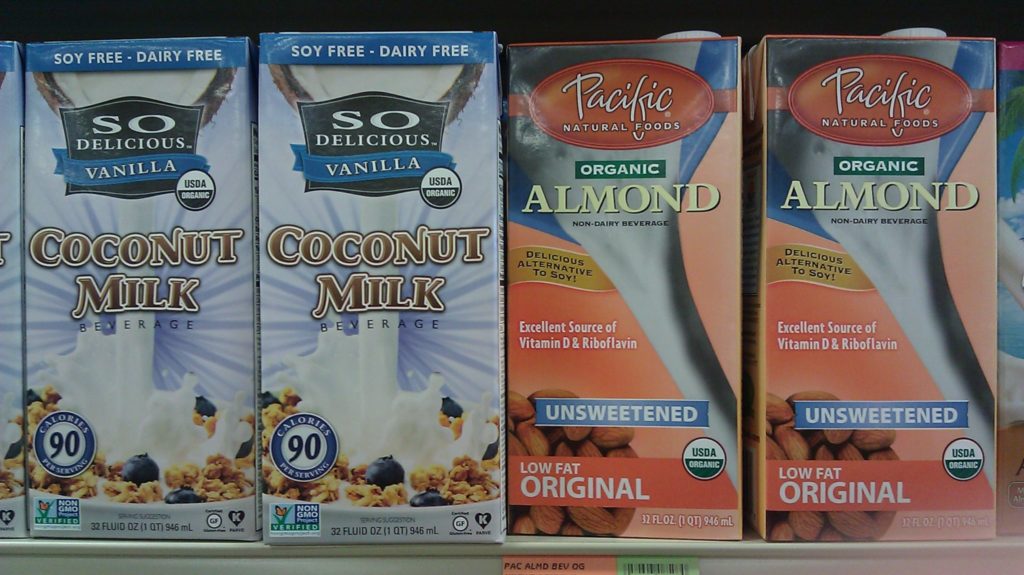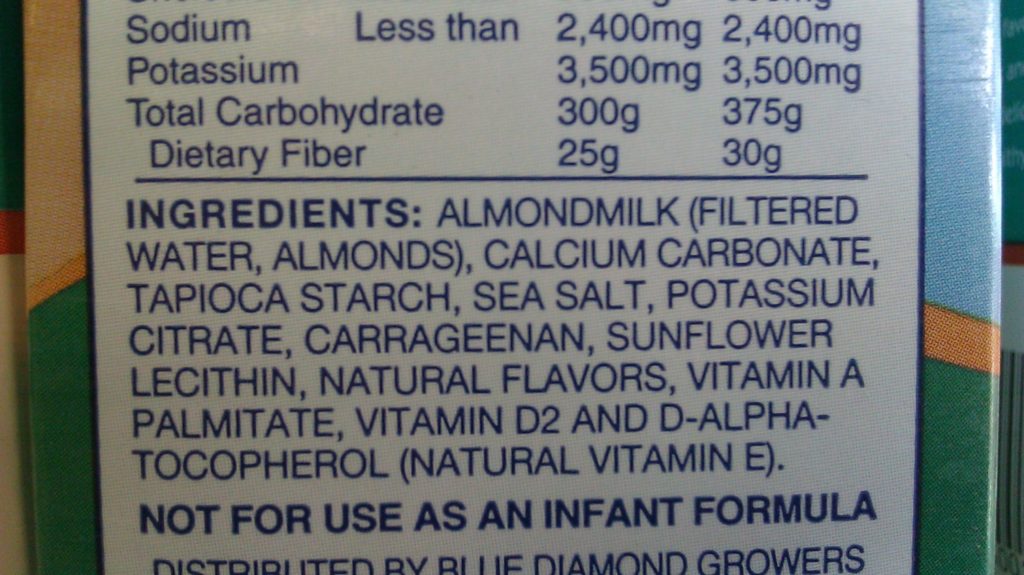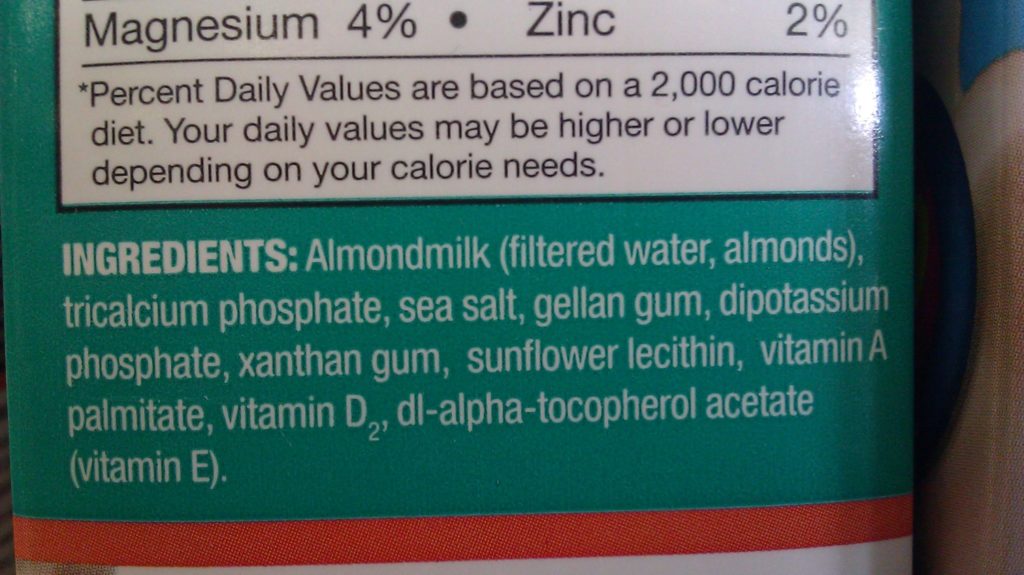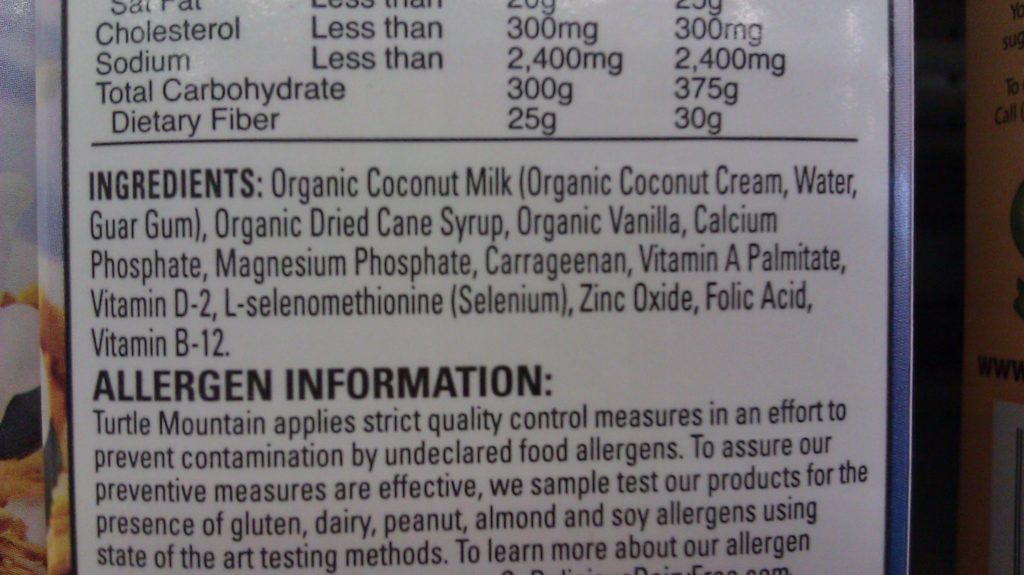 Organic coconut milk and almond milk are common purchases at the health food store by those with dairy allergies. Usually, these people are savvy consumers who know enough nutritionally to avoid soy milk with its endocrine disrupting isoflavones and gastric inflaming phytates. Rice milk is also steadily declining in popularity as it is really not much more than a glass of sugar water nutritionally speaking.
Organic coconut milk and almond milk are common purchases at the health food store by those with dairy allergies. Usually, these people are savvy consumers who know enough nutritionally to avoid soy milk with its endocrine disrupting isoflavones and gastric inflaming phytates. Rice milk is also steadily declining in popularity as it is really not much more than a glass of sugar water nutritionally speaking.
Organic, unsweetened coconut milk and almond milk in cartons seem like great alternatives at first blush, but are they really as “healthy” as people believe?
Let’s take a look at the labels. I was shocked at what I found.
Check out the labels of the three brands I photographed. I checked all the brands, by the way, and they all contained the same dangerous additives I’m about to describe.

First, Vitamin A Palmitate is added, the synthetic version of Vitamin A. I personally avoid synthetic versions of Vitamin A like the plague. Every single multi-vitamin I’ve ever examined contains some form of synthetic A, including the so called “whole foods” multis.
Synthetic vitamins are the chemical mirror images of the real, natural versions. They can cause imbalances over time. Even small amounts of the synthetic fat soluble vitamins like Vitamin A can prove toxic and should be strictly avoided!
The Organic Consumers Association warns that isolated vitamins such as those produced synthetically cannot be recognized or metabolized by the body in the same way as the natural version.

Large doses of natural vitamin A are well tolerated by the body as established by researchers decades ago, however. Traditional diets contain 10 times or more of the RDA of this nutrient with no ill effect. However, synthetic vitamin A is associated with birth defects and bone fractures. It has no benefit in the diet whatsoever.

The second really bad additive in these organic cartons of coconut milk and almond milk is Vitamin D2. Vitamin D2 is a form of the wonder vitamin that you should take great pains to avoid.
In all known cases of Vitamin D toxicity where the dose was intentional, Vitamin D2 was the culprit. By comparison, Vitamin D3 is much less toxic and requires an enormous or even an accidental dose to produce any toxic effect.
Vitamin D2 is manufactured industrially by irradiating yeast. It is dangerous for D2 to be added to any food product particularly if this product would be given to children, where toxicity symptoms would appear at much lower dosages.
None of the store brands of cartoned coconut milk or almond milk were free of these dangerous and synthetic versions of the fat soluble vitamins!
Notice also that carrageenan is present in 2 of the 3 products as well! Dr. Andrew Weil has been telling people to avoid carrageenan since 2002.
Carrageenan is so toxic and inflaming to the human digestive system that this food additive is formally classified by the International Agency for Research on Cancer (part of the World Health Organization) as a potential human carcinogen.
In my view, it would be a mistake to purchase and consume these items. They are in no way health promoting or beneficial, particularly for growing children!
Healthy Alternatives to Coconut Milk and Almond Milk in Cartons
Coconut milk and almond milk should be healthy and they can be if they are produced at home without these dangerous additives. I wrote an in depth post on how to easily make these nondairy beverages yourself. This recipe for wild rice milk is a good option as well.
Believe it or not, even organic coconut milk in BPA free cans would be a better alternative to cartons of coconut milk based on my label inspection!
Check out my video on homemade coconut milk and my article on how to make healthy DIY almond milk, fermented to add probiotics and enzymes to boost immunity and improve digestion.
Sarah, The Healthy Home Economist
Sources
From Seafood to Sunshine: A New Understanding of Vitamin D Safety








My grandson’s Garden of Life Vitamin Code Kids has vitamin A (as beta-carotene) listed. Dr John Cannell at the Vitamin D Council warns we need to keep our kids away from vitamin A palmitate. I looked through a lot of brands to find this one.
what’s about oat milk?
I was deeply disappointed and wrote to Pacific Foods to tell them so, with regards to their individual chocolate almond milks. I had chosen them as a sweet treat for my kids and was really bummed when I saw they contained so little protein. Their answer was, oh well, pick another nut milk. I did. The organic refrigerated Trader Joe version, in vanilla.
Sarah, regarding your disdain for multi’s, there are a few good ones out there. Not everyone is as fortunate as you to afford access to whole foods and nutrients while pregnant or at any time. I use a brand for my clients from Synergy company. They have very few products but are dedicated to whole organic nutrition. I have also observed dramatic positive changes in my clients who take multi’s along with other lifestyle changes. We do not live in a perfect world and to suggest otherwise is delusional. I counsel clients to do the best they can with reliable resources, whole foods, exercise, sunshine, a good night’s sleep and encourage them to surround themselves with good people who strive after higher standards of ethical conduct in their work and daily living. Life is a summation of “whole” simple living. Making it too complicated invites mediocrity.
No doubt the definition of “good” varies person to person, but on this blog, a supplement is definitely identified as no good period if it contains synthetics as all multi’s do to be labeled as such by the FDA.
I would never take a supplement with a synthetic in there no matter how pristine and wonderful the remaining ingredients are and I would never advocate someone else take such a supplement either.
well said
Coconut and Almond Milk in Cartons Not a Healthy Buy http://t.co/vgqa1txQ
Once I started GAPS I couldn’t buy any more canned coconut milk because they all have guar gum as an additive (illegal on GAPS). The only can that doesn’t is Natural Value (available on Amazon) but the cans probably have BPA. I eventually ordered the Aroy-d brand online (cartons with only coconut as ingredients, from Thailand) but they were expensive. Turns out my local international market carries this brand (both milk and cream) at a fraction of the price. I know they’re not the best (the carton worries me) but I use it sparingly. It’s my compromise at this time.
I don’t do almond milk much anymore but I always made my own (almonds, milk and Blendtec/Vitamix is all you need!).
http://www.westonaprice.org/childrens-health/diet-for-pregnant-and-nursing-mothers. Homemade coconut milk is the only dairy free milk I drink. Almond milk is sooo high in PUFA’s. I don’t consider it a healthy option. I’m 8 1/2 months pregnant and have been following the guidelines for pregnant and nursing mothers by Weston A. Price Foundation. I was unable to receive raw milk for a two week period. I contacted the Weston A. Price Foundation and asked if Coconut Milk Tonic (BPA free canned coconut milk mixed with dolomite powder) would be a suitable substitute until I was able to find a new source of raw milk. They approved and said it was the best option.
We need to insist on food not being fortified and make your on when possible. Also consume less and don’t get addicted to one type, switch around
Garden of Life multi is Whole food, no synthetics. the Vit A is Not palmitate.
New Chapter Organic Perfect Prenatal–Vit A is in the form of Beta Carotene. Not sure if the “other” ingredients are okay, but I like this brand’s formula with whole foods and herbs. Maybe someone can verify?
i would like to know also